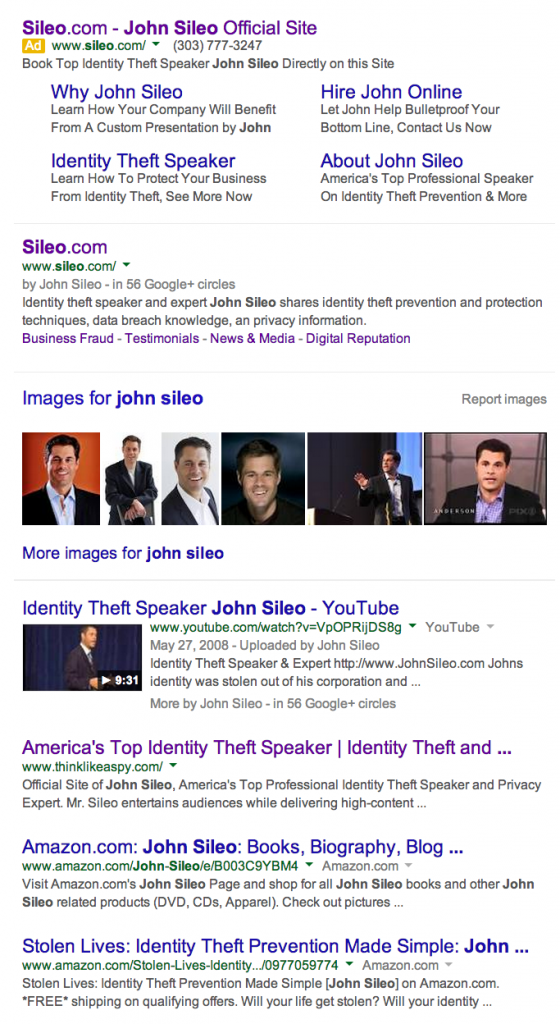Internet Privacy Expert Reviews DuckDuckGo Private Search Engine
 You certainly don’t need to be an internet privacy expert to be bothered that Google and Bing track every word you type into your browser, compile that data into a meta-profile of who you are and then sell it downstream to people who want to get to know you intimately (including criminals). Cases of browser surveillance have been documented for years. So, for example, if your daughter types the word “bankruptcy” into your browser while doing a high school report, that information is sold to the credit card company you happen to visit next who serves you to a page with a higher APR since you’ve been “flagged” as a high-risk customer (thanks to your daughter’s innocuous search term).
You certainly don’t need to be an internet privacy expert to be bothered that Google and Bing track every word you type into your browser, compile that data into a meta-profile of who you are and then sell it downstream to people who want to get to know you intimately (including criminals). Cases of browser surveillance have been documented for years. So, for example, if your daughter types the word “bankruptcy” into your browser while doing a high school report, that information is sold to the credit card company you happen to visit next who serves you to a page with a higher APR since you’ve been “flagged” as a high-risk customer (thanks to your daughter’s innocuous search term).
The implications are even greater for companies, who have a lot to lose when surfing behavior falls into the hands of competitive spies, foreign governments or organized criminals. Case in point: I recently delivered a keynote address as an internet privacy expert to a group of Latin-American journalists at a BlackBerry conference. One of the most common questions the journalists asked was how to keep Google from recording their private (and potentially politically sensitive) search terms.
I told them that completely private browsing is impossible, but that there are steps you can take to minimize the amount of your personal information being collected. One of those steps is to utilize a private search engine like DuckDuckGo.com.
Log onto DuckDuckGo.com and you are immediately struck by its simple design. Behind the clean design is a fairly sophisticated Internet search engine that emphasizes protecting user privacy. While I don’t get to see behind the magic curtain, I do believe that DuckDuckGo’s mission is to keep your surfing behavior out of the hands of corporations that want to market to you, governments that want to eavesdrop and criminals trying to crack into your net worth. Here are some of the internet privacy advantages of DuckDuckGo:
- It doesn’t track you by storing your IP addresses (a piece of ID that lets others track your surfing behavior).
- It does not log user information (and therefore can’t share or sell it!).
- It only utilizes cookies when necessary. Ok, that’s vague, but solvable with browser settings.
- It does not create a “filter bubble” based on your previous “likes” and searches, so results aren’t “one-sided”.
- It does not serve up tons of ads bombarding you – just a simple “sponsored link” at the top of your search results
Though it doesn’t really affect your internet privacy, DuckDuckGo also focuses on getting results from the best sources, not the most sources. I like the “instant answers” box that prunes out the clutter, as well as the lack of “next” pages (it’s just a continuous list of search results). The ability to use “!Bang” commands, (“kittens!yt” searches only on YouTube) is a nice touch.
If I have one reservation about this private search engine, it’s the graphical simplicity. The results are fairly vanilla with little to distinguish between different types of listings (social media, videos, Ads, etc.). In the images below, the first image is from Google and the second fro DuckDuckGo. Many users appreciate the quieter design, but I find that it requires me to read a bit more before I find the search result I am looking for. DuckDuckGo has said that their newest version (coming out soon) will give users a better graphical interface. In the meantime, this particular online privacy expert will use DuckDuckGo anytime I don’t want my search results tracked, and Google when I need a fancier display.
John Sileo is an internet privacy expert specializing in keynote presentations that make security fun, so that it works. His clients include the Department of Defense, Blue Cross, Visa, Homeland Security and associations of all sizes. Contact John on 303.777.3221.

Example from Google

Example from DuckDuckGo
Sorry, comments for this entry are closed at this time.









No Comments Yet
You can be the first to comment!